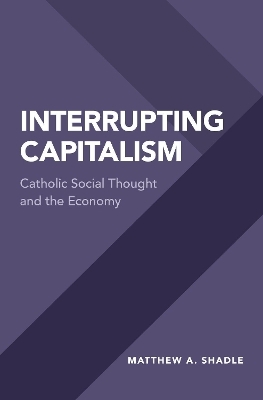
Interrupting Capitalism
Oxford University Press Inc (Verlag)
978-0-19-066013-0 (ISBN)
In the decade since the financial crisis of 2008, governments around the world have struggled to develop strategies to stabilize precarious markets, encourage growth, and combat mounting wealth inequality. In the United States, the recovery from that crisis has exacerbated the fears of the working and middle classes and pitted those classes against the wealthy. Although we participate every day in economic life as workers, consumers, employers, or activists, we often experience the economy as a mysterious force that we cannot control, or fully understand. Matthew Shadle argues that Catholics ought to be able to draw on their faith to help navigate and make sense of economic life, but too often the effort to get ahead or just stay afloat drowns out faith's appeal.
Interrupting Capitalism proposes a new strategy for Christian economic discipleship. Rather than engage the two theological poles of continuity and rupture, Christians should interrupt capitalism: neither whole-heartedly endorsing global capitalism nor seeking to dismantle it. This means "breaking into" the economy, embracing those aspects that enhance human well-being while transforming the market in a spirit of solidarity. Shadle argues that all three of the dominant theological approaches dealing with economic life-the progressive, neoconservative, and liberationist-are theologies of continuity. A fourth approach, a communitarian one, he believes, can best embody the strategy of interrupting capitalism. The Catholic tradition, including its tradition of social teaching, provides a cultural structure that, along with their own social context, conditions how Catholics think about and engage in economic activity. Drawing on the resources of the tradition, theologians reflect on this activity, giving it a theoretical justification and offering correctives. Both the experience of Catholics engaged in economic activity and the work of theologians feed into new articulations of Catholic social teaching. This teaching structure furthers economic activity and intellectual reflection on it. In offering an overview of Catholic thought since the Second World War, Shadle breaks the book into two "cycles" of this process, beginning with the experience of Catholics in Western Europe at mid-century, moving to Latin America and the United States in the 1970s and 80s, and then concluding with the phenomenon of globalization.
Matthew A. Shadle is Associate Professor of Theology and Religious Studies, Marymount University.
Acknowledgements
Chapter One: Interrupting Capitalism
Chapter Two: Three Theses for a Catholic Vision of Economic Life
Chapter Three: Reconstructing Europe's Economy
Chapter Four: Social Catholicism and Christian Democracy
Chapter Five: Modern Catholic Social Thought: Maritain and Chenu
Chapter Six: The Aggiornamento Framework
Chapter Seven: The Aggiornamento Framework's Economic Vision
Chapter Eight: Liberation Theology in Latin America
Chapter Nine: Liberation Theology and Social Analysis
Chapter Ten: American Social Catholicism and the U.S. Economy
Chapter Eleven: Progressive Catholicism in the United States
Chapter Twelve: Neoconservative Catholicism in the United States
Chapter Thirteen: The Early Teaching of John Paul II
Chapter Fourteen: John Paul II's Centesimus Annus
Chapter Fifteen: Globalization and Benedict XVI's Caritas in Veritate
Chapter Sixteen: Catholic Social Thought in an Age of Austerity
Conclusion: Pope Francis
Bibliography
| Erscheinungsdatum | 10.07.2018 |
|---|---|
| Verlagsort | New York |
| Sprache | englisch |
| Maße | 236 x 155 mm |
| Gewicht | 658 g |
| Themenwelt | Geschichte ► Teilgebiete der Geschichte ► Wirtschaftsgeschichte |
| Geisteswissenschaften ► Religion / Theologie ► Christentum | |
| Wirtschaft ► Allgemeines / Lexika | |
| ISBN-10 | 0-19-066013-9 / 0190660139 |
| ISBN-13 | 978-0-19-066013-0 / 9780190660130 |
| Zustand | Neuware |
| Informationen gemäß Produktsicherheitsverordnung (GPSR) | |
| Haben Sie eine Frage zum Produkt? |
aus dem Bereich


